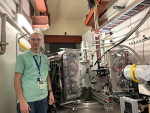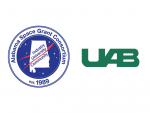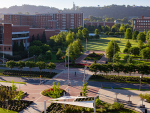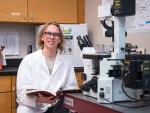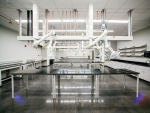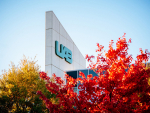Displaying items by tag: department of physics
UAB assistant professor in the Department of Physics has been awarded over $250,000 in funding for research on quantum simulation.
Tagged under
Through the Magic City Data Collective, UAB students work on data-driven projects that have impacted an estimated 200,000 to 500,000 Birmingham residents.
Tagged under
The GAANN program will support five physics Ph.D. students with an annual competitive stipend up to $37,000, along with an additional yearly educational allowance to cover graduate tuition and other costs.
Tagged under
Yager’s journey as a Blazer is filled with institutional, national and international recognition; her most recent milestone is her unique patented catalytic reactor for NASA missions that has multiple applications in various other industries.
Tagged under
Blazer Bridge Fund provides financial support to innovative ideas and inventions by the UAB community, encouraging advanced discovery.
Tagged under
- release
- harbert institute for innovation and entrepreneurship
- school of medicine
- school of engineering
- college of arts and sciences
- department of neurosurgery
- department of neurology
- department of mechanical engineering
- department of pediatrics
- department of electrical and computer engineering
- department of dermatology
- department of endocrinology, diabetes, and metabolism
- department of ophthalmology and visual sciences
- department of physics
- artplay
- uab arts
Vohra is leading the Center for Additively Manufactured Complex Systems under Extremes at UAB in advancing understanding of 3D-printed materials when subjected to extremes of pressures, temperatures and high-velocity impacts.
Tagged under
The University of Alabama at Birmingham is addressing light pollution with new Campus SHINE at UAB program.
Nine University of Alabama at Birmingham students have been awarded NASA Alabama Space Grant Consortium scholarships and fellowships.
Tagged under
- release
- college of arts and sciences
- school of engineering
- department of mathematics
- department of chemistry
- department of physics
- collat school of business
- school of health professions
- honors college
- uabteach
- department of biomedical engineering
- center for community outreach development
- graduate school
- students
UAB’s strategic planning continues to blaze its path to improve more lives by leveraging construction projects that include new and enhanced facilities across the institution, blooming green spaces and art installations.
Tagged under
- release
- office of the president
- facilities
- college of arts and sciences
- school of engineering
- department of biology
- department of physics
- department of chemistry
- department of biomedical informatics and data science
- student affairs
- school of medicine
- office of the senior vice president for finance and administration
- department of psychology
- school of nursing
- department of art and art history
- uab hospital
- department of emergency medicine
- strategic plan
- department of physical medicine and rehabilitation
- students
Two UAB Department of Physics graduates have been awarded prestigious National Science Foundation Graduate Research Fellowships.
Tagged under
A UAB physics expert breaks down the details and history of why we recognize the Gregorian calendar leap year.
Tagged under
A team of UAB students recently won $10,000 and first place in the statewide entrepreneurship competition, Innovate Alabama: Entrepreneurship Hackathon.
Tagged under
A UAB physics student is combining his love of music with the complexity of science to one day change the world through acoustics.
Tagged under
The unveiling of the new Science and Engineering Complex is helping “Forge the Future” of research at UAB.
Tagged under
The new degree programs provide students with even more options to learn from world-renowned faculty and researchers.
Tagged under
Michelle Wooten, Ph.D., assistant professor of astronomy in the Department of Physics, and eye specialists from the University of Alabama at Birmingham share some useful facts and tips to enjoy the upcoming eclipses.
Tagged under
The Magic City Data Collective has been awarded a Governor’s Work-Based Learning Best Practices award under Alabama Works.
Tagged under
University of Alabama at Birmingham student Margaret Birks is researching how methane can be used as a more economically and environmentally friendly energy source for low-income and rural communities.
Tagged under
The University of Alabama at Birmingham has been awarded $456,786 from the National Science Foundation to fund the development of a 3D-printed high-entropy alloy superconductor.
Tagged under
Six University of Alabama at Birmingham students have been awarded NASA Alabama Space Grant Consortium scholarships.
Tagged under


